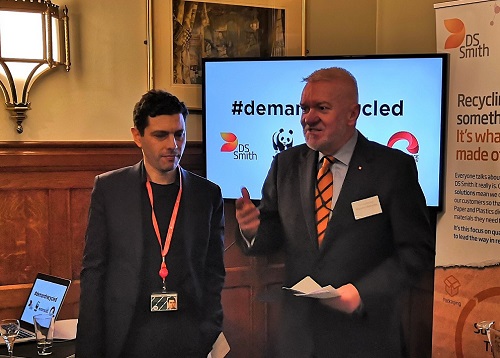A report commissioned by the Resource Association and WWF-UK has identified a ‘feebate’ system as the most attractive policy option to drive increased use of post-consumer recyclate.
A fee-rebate or ‘feebate’ system would see a levy placed on all packaging which is refunded to organisations which demonstrate their use of post-consumer recycled materials (PCR).
Carried out by consultancy Eunomia, the report also advocates the move to a single compliance scheme for producer responsibility, which it says would be complimentary to any policy option to increase demand for PCR.
Launched at the Resource Association’s Parliamentary Reception yesterday (20 November) Demand Recycled: Policy Options for Increasing the Demand for Post-Consumer Recycled Materials, analyses “market failures” which affect demand for PCR and a range of policy options to bolster demand. The event was sponsored by DS Smith and hosted by Alex Sobel, MP for Leeds North West, and member of the Environment Audit Committee.
According to the Resource Association, the report responds to the “growing need” for detail on potential policy options in the implementation phase of the forthcoming Resources and Waste Strategy for England.
Measures
Four types of policy measures to increase demand are discussed in detail in the document: materials taxation; a fee-rebate system; tradable credits and the establishment of a single Producer Responsibility organisation. It recommends further consideration of a ‘feebate’ system as the most attractive policy option.
A feebate scheme would comprise a levy on all packaging which is refunded to organisations demonstrating their use of PCR through the number of certified credits they hold. The system is favoured due to its “versatility in design, the reduced administrative complexity relative to the tax-based measure, and the stability of the incentive it gives,” the Resource Association says.
Meanwhile, the document rejects materials taxation due to the “complexity” of delivery. In this instance, a border tax adjustment would be required to ensure domestic producers are not placed at a disadvantage, the report explains.
The report also suggests “the move to a single compliance scheme for producer responsibility for packaging would help to secure the benefits of the measures”.
According to the report, a key issue in the current system – in which compliance schemes compete for recycling evidence – is the “absence of coordination” which makes it harder to ensure that there is a business case for investment in reprocessing.
‘Strong candidate’
Commenting on the report launch, Dr Dominic Hogg, chairman of Eunomia Research and Consulting, the primary author of the report, concluded: “New challenges on resource use require new thinking and new collaborations.
“As the Treasury considers its proposal for a tax on plastics, with consideration of exemptions for materials with high recycled content, we believe this type of mechanism should be a strong candidate for consideration as it combines a few with an incentive to use PCR.”
“This report now adds a real level of detail to this discussion with some much-needed fresh thinking.”
Ray Georgeson
Resource Association
Ray Georgeson, chief executive of the Resource Association said: “All parts of the resources supply chain for too long have talked in general terms about the need to boost demand for recycled material and use demand-pull measures to develop the markets to assist in reaching higher recycling targets. This report now adds a real level of detail to this discussion with some much-needed fresh thinking.”
Dr Lyndsey Dodd, head of marine policy at WWF-UK, added: “A new system is needed – where a levy on all packaging is used to reward those using the most recycled material – to incentivise the use of recycled material and support the target announced in the budget for a minimum of 30% recycled plastic in products.”
Related links
Report
The post Rebate system favoured to drive recyclate demand appeared first on letsrecycle.com.
Source: letsrecycle.com Packaging




